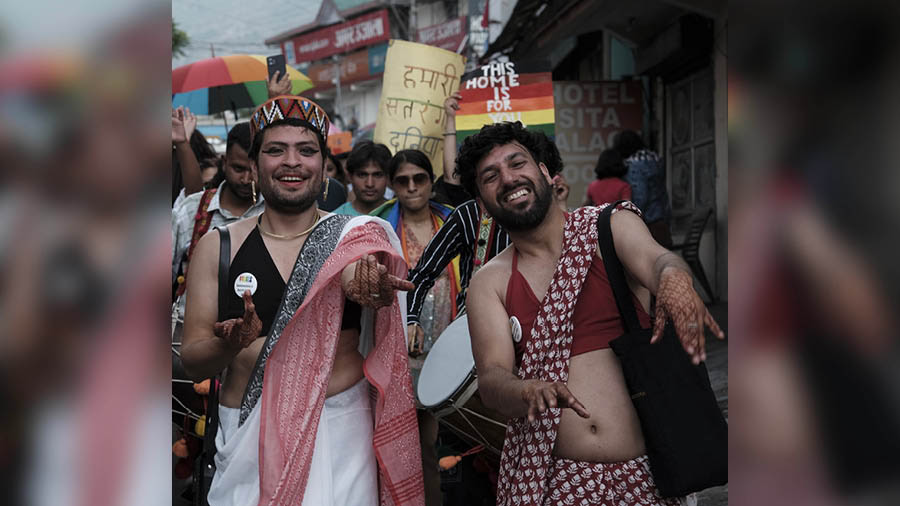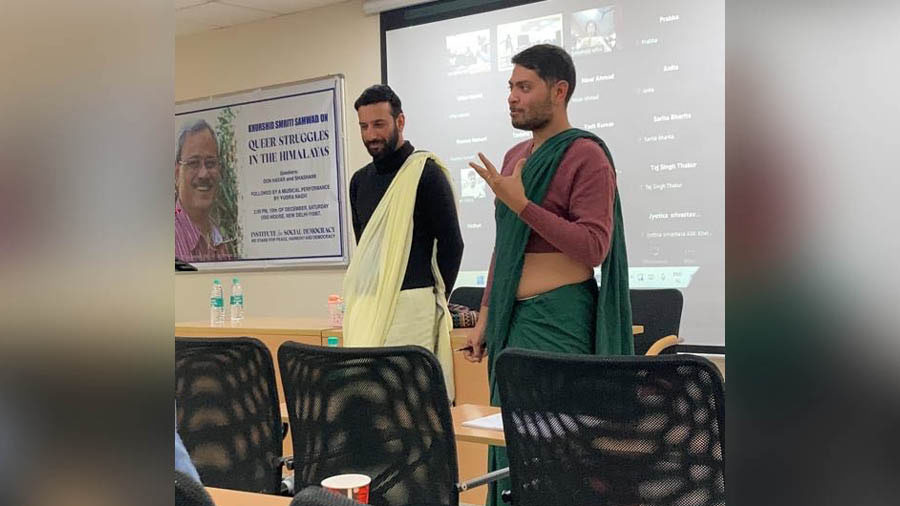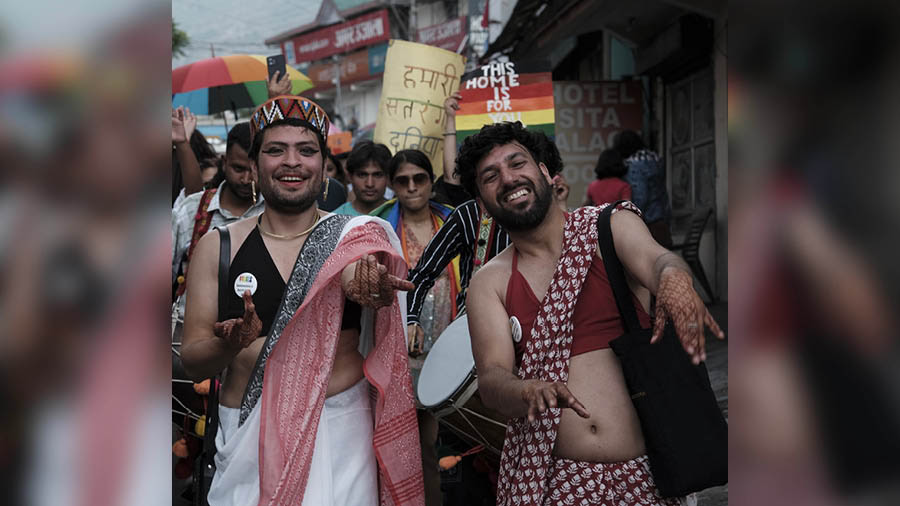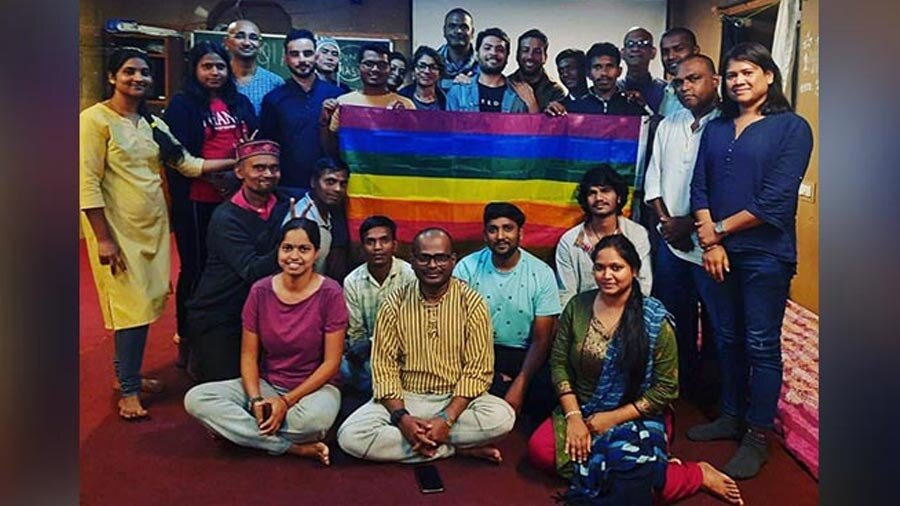
Meet Don Hasar and Shashank: The couple taking queer dialogues to rural spaces
Don and Shashank at a workshop
“We only started talking on day four of the workshop, but were immediately struck by how we saw life the same way despite coming from different backgrounds.” Don cancelled his bus ticket home and stayed back two weeks, getting to know Shashank better and eventually landing a job at the organisation. “Since then, I’ve gone back to Kolkata only once, to bring my things here,” says Don. “We realised that our struggles, dreams and politics aligned, which was very rare. We fell in love, and soon started working together,” adds Shashank.
The vocabulary of queerness
It became apparent from the start that working for queer rights in Himachal was very different from working in Kolkata, and the first hurdle to cross was vocabulary. “Queer vocabulary from the cities doesn’t exist here, because the words are in English. Here, people use the regional dialects or Hindi at most. There are people here with queer lived experiences who have identities beyond the boxes of gender, but without these terms, they don’t know who they are,” Don explains. Shashank adds that violence begins at home, but extends to schools, colleges and workplaces, and follows the community at hospitals when people go for check-ups, and even at police stations when they go to file cases against the same violence. “Imagine a queer trans person who doesn’t know their identity, but still has to go through the challenges. People living in rural areas in the mountains have lesser resources and mobility.”
People know about semi-urban pockets like Dharamsala, but more than 90 per cent of Himachal is rural. Don feels that its remote nature has led to perceptions being regulated by mainstream media as well. “People here don’t watch Schitt's Creek. They watch Bollywood. They have had years of conditioning, and assume that all trans people are hijras. When we came here, there was no concept of alternate genders.”
The couple dressed up and celebrating at Himachal’s inaugural Pride Walk in December 2021 at Palampur
In order to remove taboos around the queer community, the two have been working under the umbrella of the Himachal Queer Foundation to create an ecosystem and a safe space. The organisation has pioneered queer dialogue around the state, while also incorporating stories of people from the state into the national dialogue. For Don, the lack of such narratives in metros was a driving factor to live and work in Himachal. “What about a rural farmer who is working in the mountains, or a Dalit daily labourer? Their queerness never makes it to urban spaces.”
Their first milestone was putting together Himachal’s inaugural Pride Walk in December 2021 at Palampur. “This achievement is special because Palampur isn’t a tourist hub like Bir, but a small town that just comprises one long street. Despite this, we received a lot of love from around the country along with donations that kept us going. It made us feel like the state was finally ready for a conversation,” says Don. Shashank further emphasises on the need to use such spaces to bring together the community. “We need people uniting across demographics if we want to create awareness. The discourse must accommodate intersectionality of minorities, including those with disabilities.”
Over the course of their work, the duo noticed something unexpected. Shashank observed that the privileged and educated have usually asked uncomfortable and judgemental questions, while uneducated villagers have shown a higher rate of acceptance. “People without education don’t have a narrow worldview and accept that there are ideas outside their framework. When we go to hospitals, we notice more resistance from doctors than any other staff.”
Don agrees, sharing how people in the hills never questioned them when they introduced themselves with the name they had willingly taken, which was never the case in Kolkata. “People claim to be liberal and progressive in Kolkata, but schools and colleges have rampant queerphobia. It holds immense trauma for me, as I was always made to feel like everything I thought was wrong.”
Overcoming challenges
Things haven’t always been smooth sailing for the two in Himachal, but they’re taking it one step at a time. “People often say that the concept of queerness wasn’t there during their time and call it a ‘Western concept’. We have faced difficulty in getting permission to hold sensitisation sessions at government institutes too, but once we do, things become much smoother,” says Don. The aim is to explain to people that these issues are not foreign but their own, and they take everything with a pinch of salt knowing they can’t take offence if they want to truly reach out to someone. “When I introduce myself as a trans person, people look at my crotch and ask questions about my genitals. I can’t be offended because it comes in line with the work we are doing, and it is more important to educate, rather than get angry,” Don adds.
Himachal Queer Foundation at a workshop on laws and queer rights
Himachal Queer Foundation/ FacebookThe duo have big goals but are determined to achieve them. Don and Shashank want to establish queer-friendly spaces in every district of Himachal, and have also started working with neighbouring states like Uttarakhand, Jammu, Kashmir, Punjab and Haryana. Some of these places are still in a nascent stage with the conversation and the starting goal is to make people aware of the laws and their rights. “We want to work with the government to establish a Trans Welfare Board in Himachal, so that there are laws passed that help us with prevention of abuse, housing and reservation,” explains Shashank.
Love in the time of queer rights
While the fight can get tough on their relationship, the two credit their commitment to the cause as the primary fuel to their love. “This issue is a part of our soul. We both grew up with abuse and gender dysphoria. Finding and loving each other has also been our form of resistance” says a smiling Don. Shashank adds, “Don is as mad about this cause as I am. We complement each other’s strengths, and make up for our weaknesses. We aren’t 1+1=2. We are 11.”
They sign off, adding that this cause drives them not just to make their lives better, but also do so for those who come after them. “We don’t want the next generation to face the discrimination we did. We don’t want more Dons and Shashanks to grow up contemplating ending their lives.”




